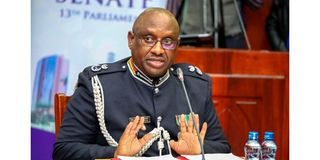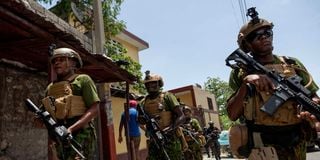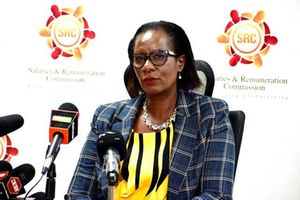'Malicious claims': IG Japhet Koome says no Kenyan police officer has been killed in Haiti

Inspector General of Police Japhet Koome.
The National Police Service (NPS) has refuted claims that seven Kenyan police officers have been killed days after landing in the troubled Haitian capital of Port-au-Prince.
Inspector General of Police Japhet Koome termed the claims circulating on social media as “unfounded, false, unpatriotic and malicious”.
“We wish to clarify to the public that our officers left Kenya on June 24, 2024 and were not only received warmly by the great people of Haiti on arrival, but are also all safe and ready to discharge their clear and specific mandate,” he said.
The police boss said the Kenyan officers have been working closely with their host, the Haitian National Police.
“They have so far undertaken strategic mapping of the key areas of operational concerns and conducted several joint patrols within Port-au-Prince,” he said.
He appealed to Kenyans to support the police as they lift the national flag high, along with discharging their international policing mandate.
“As a service, we wish to reiterate that our mission in Haiti is a noble task for the good of our brothers and sisters of Haiti,” stated Mr Koome.

Kenyan police and Haitian National Police SWAT units patrol streets in Port-au-Prince, Haiti on June 28, 2024.
The 1,000 Kenyan troops pledged by President William Ruto for the mission include teams from the Rapid Deployment Unit (RDU), Anti Stock Theft Unit (ASTU), General Service Unit (GSU) and Border Patrol Unit.
Deputy Inspector General of Police Noor Gabow, heads of operations Samuel Chebet (GSU) and Senior Assistant Inspector General Geoffrey Otunge are the police chiefs leading the Kenyan troop.
Mr Koome reiterated that NPS remains committed to collaborating with reputable media houses to update the public on the progress of the Haiti mission.
This happened as Haitian gang leader Jimmy ‘Barbecue’ Cherizier called for community dialogue to help end violence in the Caribbean nation as the first tranche touched down at Toussaint Louverture International Airport on June 25, 2024.
The international airport reopened in late May after gang violence forced it to close for nearly three months.
Riddled with decades of instability, Haiti has seen an escalation of violence following the assassination of President Jovenel Moïse three years ago.
The Kenyan police which is leading the force is facing a daunting task to edge out the violent gang that currently controls 80 per cent of Haiti’s capital.
The gang has also killed thousands of people in recent years and left more 580,000 people homeless across the country.
The arrival of the first 400 officers in Haiti last week elicited mixed reactions amongst Haitians as the troop marked the fourth major intervention in the Caribbean country.
While some welcomed Kenyan officers, others viewed the force with caution, given that the previous UN-backed intervention in 2004-2017 peacekeeping mission which was marred by allegations of sexual assault and the introduction of cholera which killed nearly 10,000 people.
But Haiti’s interim Prime Minister Garry Conille expressed confidence that the help of Kenyan-led international force will end lawlessness in the country.
“I want no-one to doubt the purpose of the mission. The state will regain power and reaffirm its authority so all Haitians can live peacefully in this country," he said.
US President Joe Biden has also welcomed the deployment, saying the Kenyan-led mission offered the "best chance" to achieve democratic governance in Haiti.
UN approved a policing mission made up of 2,500 officers from various countries as Kenya volunteered last July to lead the international force to stem the wave of violence.
Apart from Kenya, at least five other nations – including Jamaica and Benin – have told the United Nations that they are ready to deploy police officers to Haiti as part of the mission.






